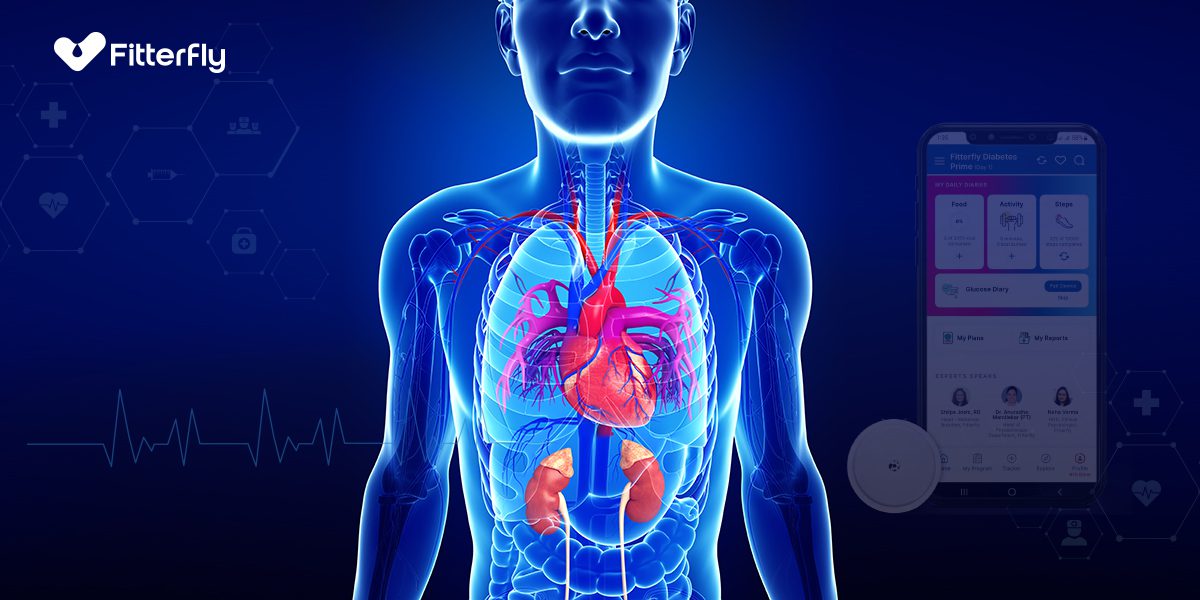Expert Strategies for Managing Cardiorenal Syndrome in Diabetes

Cardiorenal syndrome in diabetes is an adverse complication which may lead to heart failure or kidney ailments if not addressed in time. To address this multifaceted health challenge of the cardiorenal syndrome, Fitterfly organised an interactive webinar with Dr. Deepa Jayaram (Nephrologist) and Dr. Manthan Mehta (Cardiology Program Head, Fitterfly). Dr. Neelesh Bhandari (Vice President, Physician Partnership, Fitterfly) moderated the event for a seamless flow of thoughts.

Here are some of the factors which doctors should consider while addressing cardiorenal syndrome in diabetes:
Prevalence of cardiorenal syndrome among people with diabetes
There is a high prevalence of cardiorenal syndrome among diabetic patients. According to Dr. Sanjay Kalra et al.’s paper Cardiorenal Syndrome in Type 2 Diabetes Mellitus – Rational Use of Sodium–glucose Cotransporter-2 Inhibitors, 20% and 40% of diabetic patients in the UK and USA, respectively, may develop chronic kidney disease (CKD).
Similarly, one out of three diabetic patients develops cardiovascular disease (CVD), causing one in two deaths globally. The core of diabetes is insulin resistance and dysglycaemia, which affects the kidneys in terms of perfusion and can also lead to atherosclerotic cardiovascular disease and heart failure.
Understanding of diabetes complications has evolved over time
Diabetes is a polygenic disorder whose concept of complications has evolved over the years. There is a “Common Soil Hypothesis Revisited-Risk Factors for Type 2 Diabetes and Cardiovascular Disease” that says that both diabetes and cardiovascular diseases originated from the common soil, and researchers are still unsure about which disease was the first to originate among them.
Even the narrative review published in the American Journal of Public Health titled Contribution of the Nurses’ Health Studies to Uncovering Risk Factors for Type 2 Diabetes: Diet, Lifestyle, Biomarkers, and Genetics pointed out that several early-stage cardiovascular disease patients often reported the occurrence of diabetes.
The nexus between diabetes and heart disease is strong
There is no doubt that the nexus (cardiorenal syndrome) between diabetes and heart disease is strong, and it is crucial to consider diabetes management as a total effect on the body system instead of looking at it in silos.
Speakers highlighted that physicians should aim at achieving a good glycaemic legacy for patients early on in their treatment plans as it can reduce the risk of developing cardiovascular complications by 30-60% at the end of five years.
Bi-directional effect between the heart and kidneys
The bi-directional effect between the heart and kidneys suggests that any change in the heart can affect the kidneys and vice versa, thus increasing the risk of mortality among patients. Proteinuria serves as one of the earliest markers not only for kidney diseases but also for potent and adverse cardiovascular ailments.
Every T2DM patient should undergo annual screening for creatinine, urine albumin, estimated glomerular filtration rate (eGFR), Albumin to Creatinine Ratio, and cardiac biomarker to rule out cardio-renal complications.
Need to take complications seriously
The speakers emphasised the significance of considering cardiorenal syndrome for people living with T2DM seriously and not just focusing on controlling sugar levels.
Currently, there are multiple new drugs available, including SGLT2 inhibitors, Finerenone (selective mineralocorticoid receptor antagonist), and GLP-1 agonists that have salutary cardioprotective and renoprotective effects in type 2 diabetes and can delay the onset of chronic kidney disease in diabetes.
Personalised attention to patient’s constraint
While new guidelines recommend changes in medication, lifestyle modifications personalised to each patient’s constraint are also necessary. A multi-disciplinary approach that includes a psychologist is significant for comprehensive diabetes care and addressing a patient’s overall health and well-being. This personalised approach helps in the better management of cardiorenal syndrome in diabetes.
These were the most effective approaches discussed for handling cardiorenal syndrome in diabetes. You can watch the complete discussion in the video below.
About Us
We are on a mission to fuel the global metabolic health revolution through the power of Digital Therapeutics (DTx). We partner with physicians to deliver advanced customised digital therapeutics solutions aimed at enhancing the health outcomes of their patients.
By partnering with Fitterfly, you can save time in your clinics, ensure continuity of care for your patients, get research publications and also enhance your revenue. To know more, please fill out the form below or call us at 080-47093933.
This blog provides general information for educational and informational purposes only and shouldn't be seen as professional advice.
Want to know how can Fitterfly enhance your practice and improve patient outcomes?




















